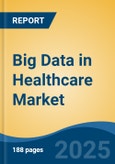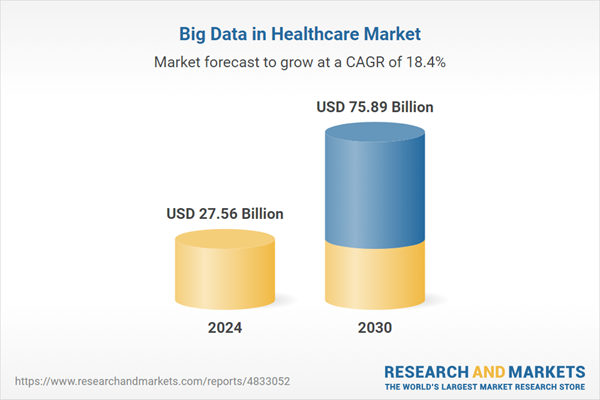Software is the fastest growing segment, North America is the largest regional market
Speak directly to the analyst to clarify any post sales queries you may have.
10% Free customizationThis report comes with 10% free customization, enabling you to add data that meets your specific business needs.
Key Market Drivers
The explosive growth in healthcare data volume stands as a foundational driver for the Global Big Data in Healthcare Market. This surge originates from diverse sources including electronic health records, diagnostic imaging, genomic sequencing, and patient-generated data from wearables. The sheer scale of this information necessitates advanced solutions for storage, processing, and analysis, as its embedded value remains largely untapped without effective big data frameworks. According to the World Health Organization, global health data generation reached 2.314 exabytes in 2023, with projections indicating a threefold increase by 2030, underscoring the urgent requirement for robust infrastructure to manage and leverage this expanding digital footprint. This continuous accumulation of health-related information fuels the demand for sophisticated big data technologies.Key Market Challenges
A significant challenging factor impeding the expansion of the Global Big Data in Healthcare Market is the persistent issue of data interoperability across disparate healthcare systems and platforms. This challenge directly obstructs the seamless exchange of patient information, preventing the comprehensive analysis necessary to derive actionable insights. When healthcare organizations cannot effectively share and integrate diverse datasets, the utility of big data analytics is substantially diminished.The lack of standardized data formats and communication protocols between various electronic health records, diagnostic systems, and real-time monitoring devices creates extensive data silos. These isolated data repositories lead to fragmented patient profiles, making it difficult for providers to gain a holistic view of an individual's health status or to identify broader population health trends. This directly hampers the market's growth by undermining the potential for advanced analytics to support personalized medicine and effective population health management.
Key Market Trends
The increased adoption of cloud-based big data platforms represents a fundamental shift in healthcare infrastructure, offering scalable and flexible management for vast data volumes. These platforms deliver essential computational power and storage for real-time access, sharing, and analysis, crucial for operational efficiency and supporting advanced applications like telemedicine. According to an analytical study by HIMSS, over 83% of healthcare organizations were utilizing cloud services in a report published in June 2024, indicating substantial industry integration. This enables efficient leveraging of complex datasets and enhanced service delivery. For instance, Oracle announced in March 2024 that it had migrated the majority of its Cerner customers to the cloud, aiming for cost efficiencies and enhanced data security.Key Market Players Profiled:
- GE HealthCare Technologies, Inc
- IBM Corporation
- McKesson Corporation
- MedeAnalytics, Inc.
- Oracle Corporation
- Premier, Inc.
- Koninklijke Philips N.V.
- Siemens Healthineers AG
- Tableau Software, Inc.
- Optum Inc.
Report Scope:
In this report, the Global Big Data in Healthcare Market has been segmented into the following categories:By Component:
- Hardware
- Software
- Analytics Services
By Application:
- Financial Analytics
- Clinical Analytics
- Operational Analytics
- Population Health Analytics
By End User:
- Hospitals & Clinics
- Academic & Research Organizations
- Others
By Region:
- North America
- Europe
- Asia-Pacific
- South America
- Middle East & Africa
Competitive Landscape
Company Profiles: Detailed analysis of the major companies present in the Global Big Data in Healthcare Market .Available Customizations:
With the given market data, the publisher offers customizations according to a company's specific needs. The following customization options are available for the report.Company Information
- Detailed analysis and profiling of additional market players (up to five).
This product will be delivered within 1-3 business days.
Table of Contents
Companies Mentioned
The companies profiled in this Big Data in Healthcare market report include:- GE HealthCare Technologies, Inc
- IBM Corporation
- McKesson Corporation
- MedeAnalytics, Inc.
- Oracle Corporation
- Premier, Inc.
- Koninklijke Philips N.V.
- Siemens Healthineers AG
- Tableau Software, Inc.
- Optum Inc.
Table Information
| Report Attribute | Details |
|---|---|
| No. of Pages | 188 |
| Published | November 2025 |
| Forecast Period | 2024 - 2030 |
| Estimated Market Value ( USD | $ 27.56 Billion |
| Forecasted Market Value ( USD | $ 75.89 Billion |
| Compound Annual Growth Rate | 18.3% |
| Regions Covered | Global |
| No. of Companies Mentioned | 11 |









